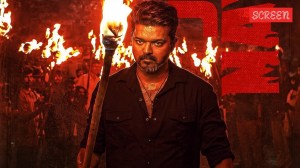Catching up on Dom
In the literary English village of Hay-on-Wye a shared memory called Dom Moraes

To get to the village of Hay-on-Wye you have to drive due west from London past the lovely town of Hereford on the Welsh Marches. Why does anyone go to Hay-on-Wye?
Well8230;it has the unique distinction of 8216;8216;specializing8217;8217; in second hand bookshops. The world8217;s largest second hand bookshop is there8230;as well as several specialist shops8230;one is dedicated to crime and detective fiction, one to children8217;s books and one to poetry. The poetry bookshop is located on a quiet road and is languidly spread over two floors. The owner is a critic and avid reader. He talks to you gently. No attempts at hard-sell, no computerized catalogues, no high pressure8230;plenty of time to walk around, to browse and to literally soak in poetry.
And in the poetry bookshop in Hay-on-Wye guess what I find? Two first editions of Dom Moraes: Poems published in 1960 by Eyre and Spottiswoode and priced at 10s 6d and John Nobody published in 1965 by the same publisher and priced at 12s 6d. I noted with some feeling that Britain was more interesting before it decimalized its currency. A shilling sounds good, spells good, feels good! And of course, between 1960 and 1965, Dom8217;s poetry seems to have gone up in financial value. The 1965 book cost two shillings more. I wondered what inflation was in the sixties. Did Dom get a proper inflation-adjusted increase? It is the kind of question that Dom would have smiled at.
The owner of the bookshop had some acquaintance with the books and seemed to know of Dom. He asked me if Dom was alive. I told him that he had died not that long ago. He asked me if Dom had been happy. I paused. I looked at him for a few seconds. I asked him in turn: 8216;8216;Are poets ever happy?8217;8217; He nodded with a measure of understanding. I had to tell him that Dom was not happy. He drank too much. His muse deserted him for long periods. He had a love-hate relationship with India where he chose to live. He was high-strung. And then I added, 8216;8216;But he did find love in his life8217;8217;. My bookseller friend responded, 8216;8216;Ah good, at least he found happiness in that regard.8217;8217;
I recommended Dom8217;s 8216;Serendip8217; anthology as it had some very finely crafted love poems. He made a note of it.
I remembered my last meeting with Dom. He had been diagnosed with cancer. Sarayu was a luminous presence. By tacit agreement, all three of us stayed away from any talk of his impending death. We talked of the book he was planning. It was based on the life of a crazy Englishman who walked all the way from England to India in the sixteen hundreds. Apparently the traveler who was also quite a scholar met the Mughal Emperor Jahangir. He seems to have died in India after a drinking bout. Dom was searching for his lost grave with an earnest sense of irony.
But of course the big C hovered in the background and insisted on intruding into the conversation. In inimitable Dom style he said 8216;8216;Now that they know I8217;m dying, old boy, some people are beginning to take me seriously.8217;8217; By implication, of course, he hated pompous people who took themselves seriously. We switched topics to India8230;she who tantalizes, excites and also wrecks all our lives. Dom had a deep feeling for India, which at its root was not cerebral but sentimental and emotional, although he would never have admitted to it. We meandered back and forth. We talked of his father8230;.always a sensitive subject. To be the son of a brilliant and well-known public figure is difficult. Success came easily to Frank Moraes and came to him steadily throughout his life. Dom had tasted success very early in life8230;he had been a bit of a prodigy and had received heady praise and great reviews for his early poetry. And then things went wrong or at least did not go right. It is almost as if his stars turned phlegmatic. It isn8217;t as if he did not do interesting things8230;he traveled a lot, he wrote interesting prose, dabbled in journalism and biography8230;he dazzled beautiful women, he drank himself into interesting states where his quiet sense of humour never left him and late in life the departed muse returned and he wrote some bewitching delicate verse8230;and yet he knew, we all knew, that Dom simply did not live up to his promise. He could have been a Larkin or a Housman. The gods somehow withheld from him their final touch of grace. And no one was more aware of it than Dom himself. It was at the root of his mordant observations, his struggle with his own demons.
As the evening wore on, we talked of Dom8217;s early romp through India along with fellow-writer Ved Mehta who called him Domikins. Dom was happy to relive the energy and the sarcasm of his early prose. Dom was very enthusiastic about a new publisher in Kerala who was into poetry8230;obviously a lovable if financially unsophisticated publisher. We knew that there were just a few months left. We did not mention it. We simply parted. I remember watching him and Sarayu get into the car. Who would have guessed that it would be weeks not months and that I would never see him again.
Standing in the bookshop I read Dom8217;s prophetic lines written fifty years ago 8216;8216;I think of the tears I have wept and shall weep, There8217;s a child in my body: it longs to confess.8217;8217; There was within Dom a half-serious half-impish child and overlaid on that was a patina of rootless cosmopolitanism, miasmal wanderings, unnamed sorrows, unfulfilled wishes. In reconnecting with Dom in a quiet English village I felt a sense of cathartic relief. Wherever you are old boy, your friends will join you soon and over a drink and a cigarette we shall dissect and patch back the fate of Indians and lovers of words.
The writer is chairman/CEO of MphasiS
- 01
- 02
- 03
- 04
- 05































